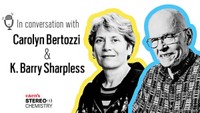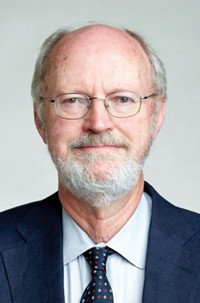Advertisement
Grab your lab coat. Let's get started
Welcome!
Welcome!
Create an account below to get 6 C&EN articles per month, receive newsletters and more - all free.
It seems this is your first time logging in online. Please enter the following information to continue.
As an ACS member you automatically get access to this site. All we need is few more details to create your reading experience.
Not you? Sign in with a different account.
Not you? Sign in with a different account.
ERROR 1
ERROR 1
ERROR 2
ERROR 2
ERROR 2
ERROR 2
ERROR 2
Password and Confirm password must match.
If you have an ACS member number, please enter it here so we can link this account to your membership. (optional)
ERROR 2
ACS values your privacy. By submitting your information, you are gaining access to C&EN and subscribing to our weekly newsletter. We use the information you provide to make your reading experience better, and we will never sell your data to third party members.
Nobel Prize
Movers And Shakers
How is directed evolution changing the world?
Newly minted Nobelist Frances Arnold talks about the past and future of evolved enzymes
by Bethany Halford
October 30, 2018
| A version of this story appeared in
Volume 96, Issue 44

From all appearances, Frances H. Arnold has mastered the art of travel. Seemingly impervious to jet lag, she was a patient and polished subject when C&EN interviewed her in Boston on a Wednesday morning in October, precisely two weeks after the announcement that she won the 2018 Nobel Prize in Chemistry. The day before, she’d been in Albany, and the day before that she’d been on the Hawaiian island of Oahu. These were all trips she planned before learning she won the Nobel—an accolade that tends to boost its recipients’ opportunities to travel by an order of magnitude.
“Life is a tornado, and I am a leaf,” Arnold says. As the Linus Pauling Professor of Chemical Engineering, Bioengineering & Biochemistry at California Institute of Technology, Arnold’s schedule was already packed. Now she’s trying to figure out how to juggle her teaching responsibilities and the lectures she promised to give with writing her Nobel address, preparing for the trip to Stockholm, and tending to the massive influx of press interviews, invitations, congratulatory emails, and Twitter shout-outs that have come with winning the Nobel Prize.
Fittingly, Arnold was on the road when the momentous early-morning announcement came. “I was in Dallas in a hotel room,” she says. “I had arrived at midnight, crawled into bed around one in the morning, and then the telephone rings,” she recalls. “I’m a mother so I keep my cell phone on all night. When the telephone rang, my first response was that there was some problem at home, but I saw the number was from Europe, and I said to myself, ‘I’d better answer this.’ ”
Vitals
▸ Hometown: Pittsburgh
▸ Education: B.S., mechanical and aerospace engineering, Princeton University; Ph.D., chemical engineering, University of California, Berkeley
▸ Jobs held before her career in science: Waitress, taxi driver
▸ Favorite book: “Darwin’s Dangerous Idea: Evolution and the Meanings of Life,” by Daniel C. Dennett
▸ Fashion designers who have offered dresses for her to wear at the Nobel festivities: “Not one,” Arnold says. “Please publish that. I wish they would; then I wouldn’t have to worry about a dress.”
▸ Travel accessory she can’t live without: An iPod with 400 audiobooks. “That’s how I go to sleep at night; I let someone read to me,” she says.
Although there were hints that Arnold might win the big prize, she says she didn’t expect it. “To expect a Nobel Prize is silly because there are many people who could win a Nobel Prize, whose science deserves a prize at that level. And very few get it.”
Arnold will receive half the approximately $1 million prize for her work on the directed evolution of enzymes. George P. Smith of the University of Missouri and Gregory P. Winter of the MRC Laboratory of Molecular Biology will share the other half of the prize for their work on phage display of peptides and antibodies. Both areas of research harness evolution to solve practical problems.
Back in the early 1990s, Arnold became intrigued with the idea that enzymes found in nature could be tweaked to perform new tricks by altering their DNA blueprint. “Nobody knows what sequence of DNA will encode a better enzyme. It’s a very challenging problem because enzymes are complicated,” Arnold explains. “But nature has a wonderful design process for manipulating DNA to achieve useful functions, and that’s called evolution.”
Arnold recognized that she could manipulate the evolutionary process just like people have been doing for thousands of years by introducing mutations into DNA through breeding. “We’ve used evolution to modify the biological world at the level of DNA, making corn and poodles and hairless cats,” she says. Instead of selectively breeding plants or pets, Arnold uses molecular biology to breed enzymes. “I use evolution to compose new DNA, breeding in the test tube just like you breed cats and dogs: Make mutations, choose the best ones, repeat it until you have what you want.”
Advertisement
Directed evolution has been used by Arnold and others to make all manner of molecules that would otherwise require lengthy, expensive, and often environmentally unfriendly syntheses. The list of products made enzymatically includes the biofuel isobutyl alcohol and the antidiabetic drug sitagliptin. “Anytime a toxic metal reagent is replaced with an enzyme, I cheer,” Arnold says. “Anytime a seven-step chemical synthesis is replaced by a single enzymatic transformation, I cheer because it’s good for our planet.”
Arnold says she knew almost immediately that directed evolution would become an extremely useful method for scientists because her evolved enzymes adapted quickly, taking on new and useful properties with just a few mutations. “People in industry immediately loved it,” she remembers. For those scientists, it offered a reliable optimization process that could solve problems, she says.
But others, Arnold says, questioned its value. Some researchers thought if she wasn’t designing the enzymes she made, the science wasn’t worthwhile. “However, that changed as we showed time after time surprising and interesting results,” she says.
Arnold points out that others have made contributions to the field of directed evolution. “The great thing about a simple method is that many people can use it, and I chose to publish it rather than patent the process early on,” she says. “As a result, everybody who really cared about making a new enzyme with some practical application started using it.”
And the method has the potential to tackle many practical problems. “We’d love to have biological systems that rapidly break down plastics. We’d love to have better enzymes for conversion of sunlight and carbon dioxide to fuels and chemicals,” she says. “If we find new or better ways to do it, those would solve big problems.”
For her own research, Arnold says, “What I’m really interested in now is the evolution of novelty. How do you create enzymes and catalyze reactions that are completely unknown in nature?” As an example, she points to an enzyme her group created that forges C–Si bonds—a transformation not found outside the lab.
Arnold’s love affair with chemistry came late in her education. Her undergraduate degree is in mechanical engineering. “I had to grow up before I appreciated chemistry,” she says, noting that she didn’t take organic chemistry until she was a graduate student. “Sometimes people accuse me of practicing without a license, but in my case it’s been useful.”
In addition to her academic pursuits, Arnold has cofounded two companies, Gevo and Provivi, and she’s been on the founding advisory boards of many others. But what really drives her, she says, is scientific discovery and training new scientists.
“I work with the smartest young people in the world, who come to Caltech and want to change the world,” she says. “I have 20 people like that in my lab now, and I’ve worked with hundreds over my career.” Arnold says these relationships have been particularly meaningful, as she’s experienced tragedy in her personal life. She lost both her husbands, one to cancer and one to suicide, and one of her three sons died in an accident two years ago. “I’ve lost people I love in my life, but I gain new ones every year,” she says.
To show her appreciation for her students, Arnold uses the money from her awards to fund excursions for her group. Her lab’s most recent retreat was on a cruise to Ensenada, Mexico. After all, she says, these prizes recognize their work.
As for her Nobel winnings, Arnold says the Swedish money will be staying in Sweden: “I’m going to put on one hell of a party in Stockholm.” She will be traveling with an entourage of 50 people.
Arnold says winning the Nobel is a professional highlight that’s hard to beat. But she has no words of wisdom for others hoping to achieve the accolade. “If I give any advice, it’s to enjoy what you do day to day,” she says. “And take risks. I think it’s important for people not to follow a recipe. There is no recipe for success.”




Join the conversation
Contact the reporter
Submit a Letter to the Editor for publication
Engage with us on Twitter